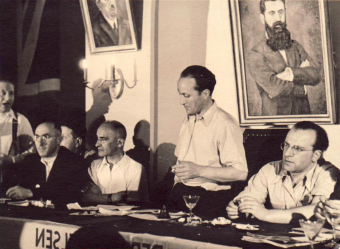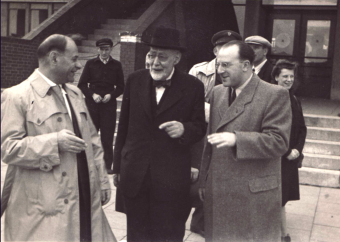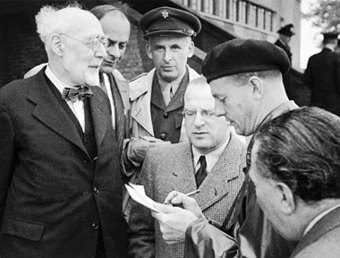Involvement in Rebuilding Jewish Community Life in Germany

© United States Holocaust Memorial Museum (Wollheim papers)
(Conversation between Federal President Theodor Heuss and Norbert Wollheim in Kiel on January 19, 1950—transcript. (Zionist Central Archives, Jerusalem, Shalom Adler-Rudel papers, file A140/58). In: Yeshayahu A. Jelinek, ed.: Zwischen Moral und Realpolitik. Deutsch-israelische Beziehungen 1945–65. Eine Dokumentensammlung (Gerlingen: Bleicher, 1997), pp. 135–138, here pp. 136–137. (Transl. KL))
The Central Committee of Liberated Jews in the British Zone, of which Norbert Wollheim served as deputy chairman, had always viewed the residence of Jews in Germany immediately after the Holocaust as only a temporary circumstance, the overcoming of which was its primary task. In that opinion, it was in accord with the assessment of Jewish life in Germany common to many Jewish organizations following World War II. This was expressed, for example, by the conference of the World Jewish Congress in Montreux in 1948, which adopted a resolution stating “the determination of the Jewish people never again to settle on the bloodstained soil of Germany.”[1] Norbert Wollheim, too, made similar remarks on that occasion, but in the course of the following years he was willing at the same time to accept that there were Jews who decided in favor of remaining in Germany. It was becoming increasingly apparent that some of the Displaced Persons (DPs) and returned emigrants wanted to rebuild Jewish life in Germany on a permanent basis, even if they frequently met with hostile reactions. Wollheim rejected the notion that “the hatred directed at the Germans [would be] extended to include the Jews in Germany or displaced onto them,”[2] and he wondered, “Why must the ‘historical answer’ to Germany be argued out on the backs of the Jews in Germany, who have been battered enough as it is?”[3]
Norbert Wollheim had a role in creating permanent structures for the recently begun rebuilding of Jewish community life in the Federal Republic of Germany. On July 19, 1950, the Central Council of Jews in Germany (Zentralrat der Juden in Deutschland) was founded; the four members of the board of directors were Philipp Auerbach, Heinz Galinski, Pessah Piekatsch, and Norbert Wollheim.
On January 19 and March 20, 1950, Wollheim already had met with Theodor Heuss, the president of the Federal Republic of Germany, who was seeking unofficial ways to establish contacts with, and make an approach to, Israel. Wollheim reported on these meetings to Shalom Adler-Rudel, director of the Office for International Relations at the Jewish Agency, with the express request that his accounts “be forwarded to the office in Israel that you think is responsible for handling these matters.”[4] He said that in talking with Heuss, he had expressly pointed out the problems of “Germany’s re-Nazification,”[5] the personal continuities, as in the case of the director of the Federal Chancellory, Hans Globke, “the resurgence of overt and covert anti-Semitic propaganda,”[6] and mentioned “the discouraging decisions of various courts in political trials and/or proceedings related to crimes against humanity.”[7] Norbert Wollheim clearly articulated his disappointment at the developments in postwar Germany, which reinforced his personal decision to leave the country as soon as the necessary help for the Displaced Persons was firmly in place.
In August 1951, the Central Committee of Liberated Jews in the British Zone was finally disbanded, as its work was done. In September, Norbert Wollheim and his wife Friedel, whom he had met in Belsen, emigrated to the United States, along with their two children, whom he did not want to see grow up in Germany.
(MN; transl. KL)




















